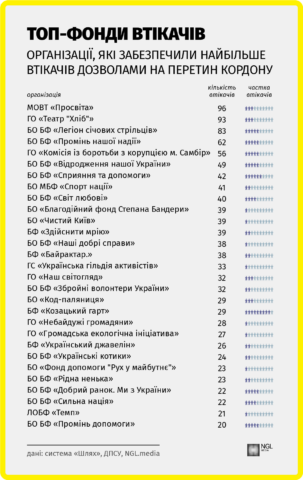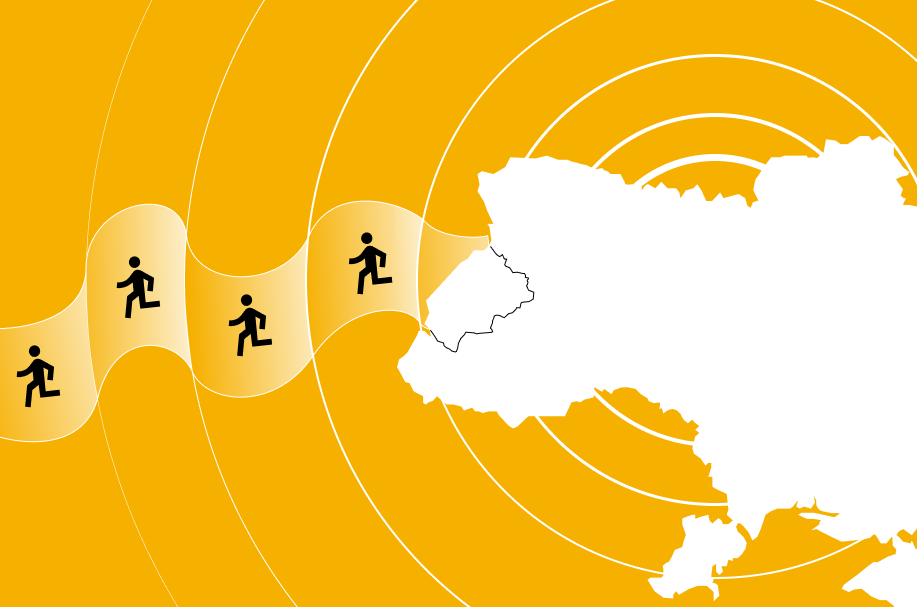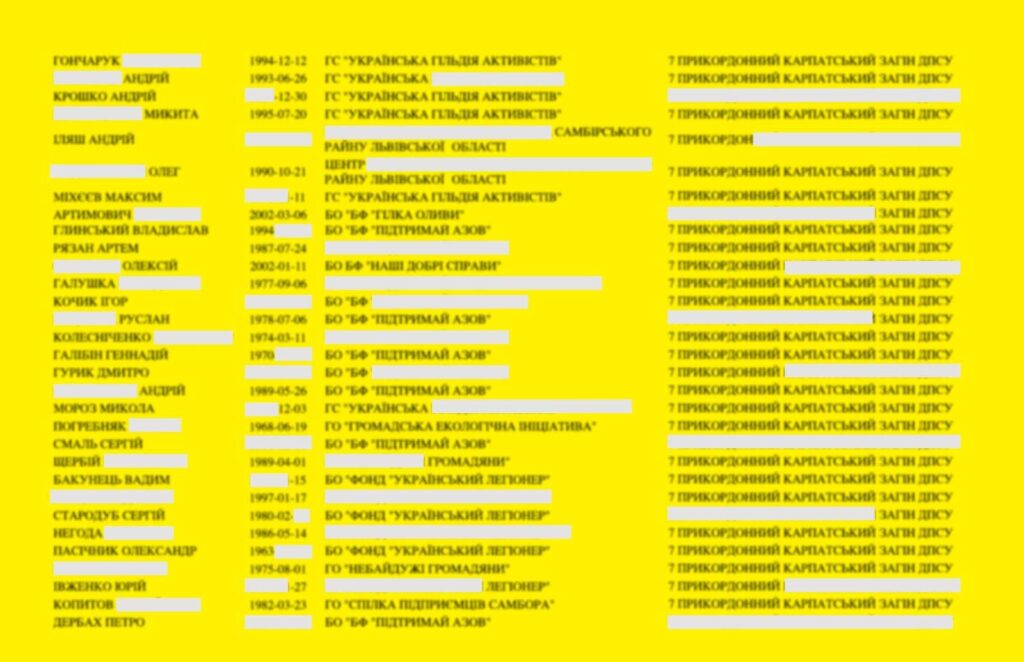The abuse of the Shliakh system, designed for long-distance truck drivers and allowed for volunteers by the government since the beginning of the large-scale war, has grown to such magnitude that it has to be dealt with.
NGL.media has been investigating the use of the Shliakh system for several months, and we have found hundreds of non-governmental organizations and charitable foundations involved in arranging the escape of the men of fighting age from the country. We have identified the names and surnames of 2,248 men who left the country using permits from the Lviv Regional Military Administration (RMA) and never returned.
According to different estimates, in the black market, this “service” costs USD 3,000–5,000 per person, so it actually means tens of millions of dollars.
We have intentionally refrained from publishing the surnames of the draft dodgers. Instead, we decided to concentrate on the investigation of non-governmental and charitable organizations that had deliberately or unintentionally helped them by submitting the corresponding applications to the Lviv RMA.
NGL.media has found a total of 372 such organizations and is telling about the leaders of this “top”-list, which assisted hundreds of draft dodgers in their leaving.
The unexpected record-holders of our investigation turned out to be two organizations, working from the same address in the city of Mykolayiv in the Lviv region – a local centre of the All-Ukrainian Prosvita Society and NGO Teatr Khlib.
These two are among the five organizations which received the highest number of permits via the Shliakh system. About 200 men managed to run away, thanks to these two organizations only.
The letters to the Lviv RMA on behalf of the Mykolayiv centre of Prosvita were written by the head of this organization, a 34-year-old Nataliia Mukha, who also runs the Mykolayiv folk theatre, called Khlib. And the letters from NGO Teatr Khlib were written by its director, a 22-year-old Roman Zbudovskyi, a member of Khlib theatre, as the inquiries of NGL.media helped determine.
Both Nataliia Mukha, and Roman Zbudovskyi ignored the calls and letters in the messengers in which we asked them to comment the figures revealed by NGL.media.
 We realize that some runaways could escape of their own volition without informing the heads of these organizations. Yet their keen intention to avoid giving any explanations invites the assumption that these directors have something to hide.
We realize that some runaways could escape of their own volition without informing the heads of these organizations. Yet their keen intention to avoid giving any explanations invites the assumption that these directors have something to hide.
Old acquaintances
The list of organizations, from which the highest numbers of men left Ukraine, turned out to contain many names, already known to us. In particular, these are the Commission on Combating the Corruption in the city of Sambir and the “Vidrodzhennia nashoi Ukrainy”. According to our calculations, more than 100 men from these organizations left the country and did not come back.
Previously, Mykola Starodub, the head of the Commission on Combating the Corruption in the city of Sambir, told that he “was asked to put his stamp, so he did because he thought that humanitarian aid had to be brought in”. And Anatoliy Donets, the director of the “Vidrodzhennia nashoi Ukrainy”, allowed for his organization to be used in exchange for him to be taken abroad.
After NGL.media published its article, “The False Way”, the activity of both organizations became the subject of the study in a criminal investigation, but we don’t know at which stage it currently is. At present, the court is considering the indictments following the investigation regarding three people: Liubomyr Protsiuk and Mykhailo Vasylyk, as well as Andriy Shpak, who is accused not only of illegal transfer of people abroad but also of violating art. 358 CC (forgery). Due to Shpak’s mobilization, recently his case has been isolated separately, and the court proceeding was suspended, which means that his case will not be heard until he has been discharged.
During the new investigation, we found another organization that might be involved in this story. As per the information from the Lviv RMA, the telephone number of Anatoliy Donets was stated on the applications, submitted by one “Blahodiinyi Fond Stepana Bandery”, via which about 40 men left and never came back. Yet he claims that it is the first time he has heard about this organization and that he has never sent any applications on its behalf. Previously Ihor Fesan, the head of the “Blahodiinyi Fond Stepana Bandery”, claimed that he had not sent any applications to the Lviv RMA either, and now he refuses to communicate.
Our “top”-list happens to contain another group of related volunteer organizations, described in our article “One-Way Tickets” – “Chystyi Kyiv”, “Bayraktar”, “Nashi dobri spravy”, “Ukrainska hildiia aktyvistiv”, “Nebaiduzhi hromadiany”, “Ukrainian Javelin”, “Hromadska ekolohichna initsiatyva”, “Ukrainski kotyky”. Our estimates show that more than 200 men of fighting age left from this group and never came back.
“Not our signatures, not our seals”
A number of previously unknown organizations happened to be in our list as well. For instance, these are such foundations as “Lehion Sichovykh Striltsiv” and “Promin nashoi nadii”. The telephones of these organizations are either turned off or invalid, and there is no information about their activity. These foundations are officially registered in Lviv, but their founders are registered in the same street in Truskavets. Nobody answered our letters, addressed to the “Promin nashoi nadii”. We did get a reply from the “Lehion Sichovykh Striltsiv”, but they never contacted us again after our mention of the Shliakh system. A total of almost 150 people did not come back after leaving the country with the assistance of these organizations.
 We didn’t succeed in contacting the management of the foundations “Spryiannia ta dopomoha” (43 draft dodgers), “Zbroini volontery Ukrainy” (32), “Kod-Palianytsia” and “Kozatskyi gart” (29 runaways each).
We didn’t succeed in contacting the management of the foundations “Spryiannia ta dopomoha” (43 draft dodgers), “Zbroini volontery Ukrainy” (32), “Kod-Palianytsia” and “Kozatskyi gart” (29 runaways each).
Yet we managed to talk to representatives of the foundation “Ridna nenka” (23 men). Pavlo Tuziak, its former director, claimed that they had not submitted these surnames in their lists to be added to the Shliakh system at all.
We made an inquiry to the Lviv RMA and received copies of the applications, submitted by “Ridna nenka” – some documents contain the name of Pavlo Tuziak. When we showed these applications to him, he argued that these were “not our signatures and not our seals”. However, Tuziak was not willing to share the photo of the real seal and signatures, claiming that he would do so “only after the court’s decision”. So, the fact of forgery should be either confirmed or denied by the enforcement authorities.
The list also contains rather well-known organizations, for instance, “Fond dopomohy “Movement to Future”, related to Hryhorii Kozlovskyi, a renowned Lviv businessman. We found the surnames of 23 men who left thanks to this organization and never came back, and we shared this list with Oleh Shpur, a foundation signatory.
“We didn’t ask for permits for them on behalf of our foundation. We analyzed all these applications. [We recognized] only 7 people from the list,” he claims, but he sent us only six surnames. Oleh Shpur also added that one man from our list left the country with the British passport, and the rest of the men came back.
 We checked these six people. One of them indeed left owing to his foreign passport, and another one – as an escort for a disabled child. One more man came back in July, after our conversation. Yet we didn’t succeed in confirming the return of three other men. One of them hung up as soon as he heard the question. We didn’t manage to find the phone numbers of others, so we asked Oleh Shpur to share their contact data with us, yet we never got it.
We checked these six people. One of them indeed left owing to his foreign passport, and another one – as an escort for a disabled child. One more man came back in July, after our conversation. Yet we didn’t succeed in confirming the return of three other men. One of them hung up as soon as he heard the question. We didn’t manage to find the phone numbers of others, so we asked Oleh Shpur to share their contact data with us, yet we never got it.
NGL.media received the copies of applications regarding all 23 men and sent them to Oleh Shpur, who promised to check them. As of the moment of publishing this article, we have not received the answer. Yet, if the applications on behalf of “Movement to Future” were actually forged, this organization’d better turn to the police.
For instance, Uliana Flyshko, the director of “Zdiisnyty mriiu” foundation, has already filed a report with the police. We found that 39 men left the country using the permits, granted via this organization. The director of the foundation claims that she sent the applications to the Lviv RMA only for ten of them, but several people had access to the organization seal for a long time.
Olesia Shakalo-Olshanetska, the director of “Nash svitohliad” organization, was surprised to see the list of 32 men, who fled the country on behalf of her organization. She said that many unrelated volunteers, not from her organization, contacted her and were entered into the Shliakh system. “We had to move loads, so we worked by trusting one another, just like many other organizations,” she said and advised us to talk to Ruslan Kovalenko, who had recommended these people. He never gave any comments on the list that we had sent him.
Iryna Yermolenko, the head of “Svit liubovi” foundation, did not help our investigation either. In our first conversation, she said that she knew only about three people who did not come back, and two of these are getting their treatment abroad, so she was surprised by the information about 40 runaways. After we sent a list of these men to her, she stopped communicating with us. The same situation happened in case of Oleksandr Pavelets, the head of “Sport natsii” foundation, who stopped answering our calls and messages after getting the list of men.
The same game rules
After regular scandals related to the abuse of the Shliakh system by the draft dodgers, the government decided to introduce changes to the legislation, worked out with the consideration of the opinion of the regional military administrations. Serhii Derkach, the Deputy Minister for Communities, Territories, and Infrastructure Development of Ukraine, says that the Lviv RMA was an active participant in this process and had even introduced additional requirements to the applicants before.
“We, as a ministry, and [Lviv RMA] introduced the obligatory electronic signature. We really want to have the same rules for all the administrations because if one regional administration just introduces some strict rules today, then some dishonest volunteers will just go to another administration, which does not have these rules,” says Serhii Derkach. “We took into account all the comments and remarks [from RMAs], and everyone was very positive about enhancing the control. We talked about the electronic digital signature, about specific terms of considering the application, not only about the substantiation of one’s leaving but also about submitting the relevant documents from the grantees of this approval. We also talked about the integration with the database of customs declarations so that we could have information about the cargo being brought in. We had some cases when, unfortunately, people drove out and came back on foot; I guess they were bringing humanitarian aid in their pockets.”
In addition, the draft document, composed by the Ministry of Infrastructure, envisages the introduction of drivers to the system only by the organizations that have some experience and have worked for at least several months. There will also be specific refusal criteria along with a particular time period to consider their applications, set to mitigate the risks of corruption.
“We consider the possibility of banning the organizations [to enter any data to the Shliakh system] for some time. If the charitable foundation violated the rules, set by us, then, for instance, it can’t have any trips abroad for half a year, and this will be such a conditional ban, which will yield its results, we believe,” explains Serhii Derkach.
At present, neither military administrations nor the Ministry of Infrastructure have access to the border control databases, so they don’t know about the ones who left and never came back. The only information regarding this matter which was made public, is the information disclosed by the ad-hoc inquest committee of the Verkhovna Rada, which states that as of late April, almost 19 thousand men of fighting age left owing to the Shliakh system and did not come back.
There is no official “black list” of dishonest foundations and non-governmental organizations. It is only known that the Ministry banned access for 10 transporting organizations.
“The licensees enter the data of their drivers into the Shliakh system on their own. The Ministry of Infrastructure has nothing to do with them. These 10 I told you about – these are licensees. That is, I am a transporting organization, I have my own account in the Shliakh system, I don’t have to contact the Ministry of Infrastructure or the regional administration,” Serhii Derkach says. “As for “black lists” in regions, I have neither heard nor seen such information in mass media, but, frankly speaking, there are no legal grounds [for it]. For instance, how many runaways are enough for the organization to be introduced to the “black list”? Did these people not come back, or did they violate the terms of staying abroad?”
Besides, the actual plans of drivers are not always known to the transporters, foundations, or NGOs. As per the Deputy Minister, there were cases when drivers of transporting companies did not come back without informing their management. A driver just leaves the truck somewhere, calls, and says, “I have left the truck, but I am not coming back to Ukraine.”
At present, there is no administrative or criminal responsibility for men who used the Shliakh system to flee from the country. Previously, Ihor Klymenko, the Minister of Internal Affairs, claimed that men who left Ukraine during the martial law should be punished after their return. It raised a discussion in society. In Serhii Derkach’s opinion, it is essential to distinguish between the violation of the terms of returning and a failure to return.
“If we make it an offence and set the responsibility, will we not decrease the number of those citizens who might still come back to Ukraine? It is our task – to bring all Ukraine’s citizens back home. It is not within our authority to solve the issues of making something an offence. On our part, we try to make fraudulent actions regarding the trip abroad impossible and prevent them,” he says.
This article was also contributed by Oleh Onysko (editor) and Nazar Tuziak (infographics)
